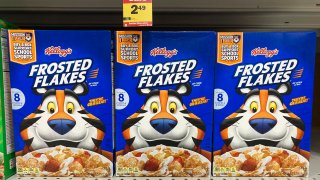
- Kellogg plans to separate into three independent public companies, sectioning off its iconic brands into distinct snacking, cereal and plant-based businesses.
- The company said it is exploring further strategic alternatives, including a potential sale, for its plant-based business.
- The tax-free spinoffs are expected to be completed by the end of 2023.
Kellogg is planning to separate into three independent public companies, sectioning off its iconic brands into distinct snacking, cereal and plant-based businesses.
Shares of the company rose as much as 8% in premarket trading but closed up only 1.9%.
Get top local stories in Connecticut delivered to you every morning. >Sign up for NBC Connecticut's News Headlines newsletter.
The announcement Tuesday comes a decade after Kellogg's $2.7 billion purchase of Pringles, which signaled the company's shift to focusing on the global snacks business with people increasingly eating more often between meals. Kellogg, along with rivals like Frito-Lay-owner PepsiCo and Oreo-cookie owner Mondelez, have leaned into the trend by introducing more snacks and snapping up smaller brands. On Monday, Mondelez said it is acquiring Clif Bar for $2.9 billion.
Cereal sales, by contrast, have stagnated in the U.S. as people eat on the go and reach for a greater variety of options in the morning. Brands including Special K, Froot Loops and Rice Krispies had for decades been a foundation of Kellogg, but are no longer seen as key growth drivers for the company. The pandemic briefly revived the cereal category as more consumers ate breakfast at home, but Kellogg expects flat revenue growth for its North American cereal business in the future.
"Those who scratched their head in 2012 about the zero-overlap Pringles deal should scratch no longer. It's the legacy North American business that didn't fit management's plans, and today's announcement makes that final," Consumer Edge analyst Jonathan Feeney wrote in a note to clients.
Money Report
Kellogg has been weighing spinoffs as a potential strategy since 2018, executives told investors on a conference call discussing the announcement on Tuesday. CEO Steve Cahillane said all three businesses have "significant" standalone potential, although the company is exploring alternatives including a potential sale for its plant-based business.
Combined, Kellogg's plant-based division and North American cereal business accounted for about 20% of the company's revenue last year. The remaining business includes its snacks, noodles, international cereal and North American frozen breakfast brands.
The tax-free spinoffs are expected to be completed by the end of 2023.
Names for the new companies haven't yet been decided, and proposed management teams for the two spinoffs will be announced by the first quarter of next year. Cahillane will stay on as chief executive of the global snacking company.
That business will house brands like Pringles, Cheez-It, Pop-Tarts and RXBAR and last year reported $11.4 billion in revenue. About 10% of those sales come from its growing noodle business in Africa, while another 10% comes from Eggo waffles and its frozen breakfast business. North America will represent nearly half of the company's revenue.
The snack-focused company will also be looking to add to its portfolio through acquisitions, according to Cahillane.
The proposed North American cereal company last year saw sales of $2.4 billion. In the near term, the spinoff would focus on bouncing back from supply chain disruptions and regaining lost market share. Kellogg expects it would generate stable revenue over time as a stand-alone company while improving profit margins.
"It's a pretty stable business, somewhat declining," Cahillane told CNBC's Sara Eisen on "Squawk Box." following the announcement, adding he expects more innovation and brand building from the spinoff since its brands won't have to compete with Pringles or Cheez-It for resources.
Kellogg's plant-based division will use Morningstar Farms as its anchor brand. Last year, the business reported $340 million in sales. If completed, the spinoff offers investors another plant-based stock play besides Beyond Meat, which hasn't turned a quarterly profit in nearly three years and has seen its shares tumble 63% this year.
Headquarters for the three businesses will remain unchanged. Both the North American cereal company and the plant-based food spinoff will be located in Battle Creek, Michigan. The global snacking company will keep its corporate headquarters in Chicago, with another campus in Battle Creek.
Kellogg hasn't decided yet how it will divide up its dividend among the three companies, Cahillane told CNBC.






